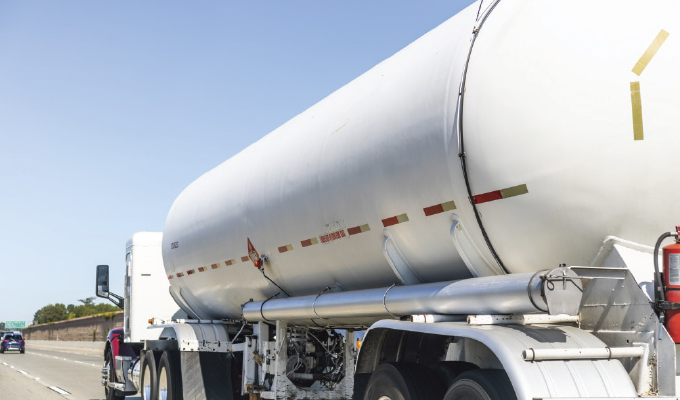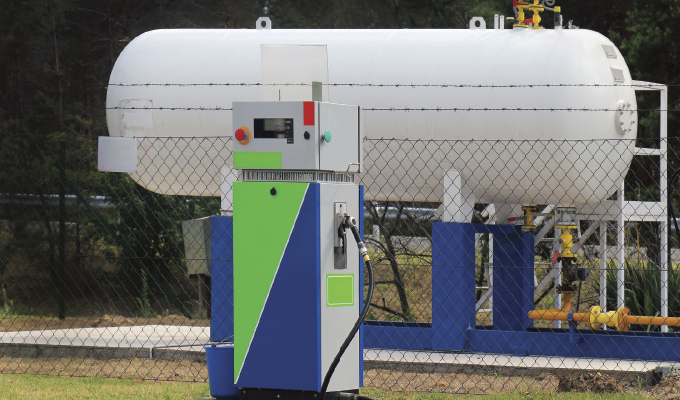For fleet owners wanting to utilize to a greener energy source without giving up reliability, efficiency, or their bottom line, propane autogas is a compelling option. Compared with other energy sources, propane autogas, also known as liquefied petroleum gas (LPG), reduces emissions, boasts lower operating costs, and offers better reliability. Frequent questions fleet operators may have when considering the transition to propane autogas are as follows.
WHAT IS PROPANE AUTOGAS?
Propane autogas is a clean energy source derived from natural gas and crude oil processing. Newer and increasingly available renewable propane is made from plant and vegetable oils, animal fats, or used cooking oil. As numerous industries have had more stringent environmental and emissions standards put in place, propane autogas has become an attractive alternative to diesel and gasoline.
WHAT ARE THE ENVIRONMENTAL BENEFITS?
One of the primary advantages of propane autogas is its lower emissions. Propane autogas vehicles emit far fewer harmful pollutants compared to traditional gasoline and diesel engines. Specifically, propane autogas engines are 90 percent cleaner than the standards set by the Environmental Protection Agency (EPA) and produce near-zero particulate matter and 96 percent fewer nitrogen oxides (NOx) than clean diesel engines.
Recent advancements in engine technology have classified many propane autogas engines as having near-zero emissions, moving closer to the goal of achieving zero emissions. By choosing propane autogas, fleet owners can significantly reduce their carbon footprint and contribute to cleaner air in the communities in which they operate.
HOW CAN FLEETS TRANSITION TO PROPANE AUTOGAS?
Fleet owners have two options for transitioning to propane autogas depending on their fleet’s current energy source.
Fleets currently running on gasoline don’t need to purchase new vehicles to make the switch. Instead, existing gasoline-powered vehicles can often be converted to run on propane autogas using an EPA-certified conversion kit. These bi-fuel systems allow vehicles to operate primarily on propane autogas while maintaining a reserve gasoline tank for added flexibility and peace of mind. Many light- and medium-duty trucks, vans, and cars can be converted using kits from certified partners located across the U.S. Over half of all propane autogas vehicles on the road today have been converted using these systems.
While diesel vehicles cannot be converted to propane autogas, replacing them with new propane autogas vehicles will save fleets money thanks to lower total operating costs over time.
WHO HANDLES THE CONVERSION?
Conversions can be done by any technician that has been through training offered by conversion partners. Fleets can work with their preferred dealership or local upfitter to ensure they receive the training to be able to install the EPA-certified propane system. Once a technician is trained, they’re able to install the propane system before delivery of the vehicle or after delivery depending on the partner.
HOW LONG DOES THE CONVERSION TAKE?
Installations can be completed within a single day with advance scheduling. This means that fleet operators can minimize downtime and quickly start reaping the benefits of running on propane autogas.
WHAT ARE THE COSTS OF CONVERSION?
The cost of converting a Class 1-4 vehicle to propane autogas typically ranges from $7,000 to $9,000. This price depends on factors such as the vehicle’s specific make and model. The quoted range includes installation labor costs, making it easier for fleet owners to budget for the transition.
WHAT COST SAVINGS CAN BE EXPECTED?
One of the most immediate benefits fleet owners notice after switching to propane autogas is the significant reduction in fuel costs. On average, costs can be up to 50 percent less than gasoline or diesel. This substantial difference in fuel prices can lead to significant savings over time.
Additionally, propane autogas engines have lower maintenance costs compared to diesel engines. Since propane is a cleaner fuel, it doesn’t require the expensive exhaust after-treatment systems that diesel engines need to comply with emission standards. Moreover, propane autogas won’t degrade or prematurely wear down engine parts over time. When properly maintained, propane autogas vehicles tend to experience fewer issues with carbon buildup and contaminants, resulting in a longer vehicle lifespan and reduced maintenance expenses.

HOW DO FLEETS REFUEL AFTER CONVERSION?
After transitioning to propane autogas, fleets have several options for refueling:
Private Station: Most fleet owners choose to build their own private station in a central location for quick and convenient refueling. Private stations include a properly-sized propane storage tank and one or more dispensers. A propane supplier can work with fleet owners to determine the right size tank for each fleet owner’s operation.
Private stations are completely customizable to meet business demands and can easily scale as the fleet expands. In some cases, a propane supplier will provide the refueling infrastructure at little to no cost in exchange for a mutually beneficial fuel contract that locks in propane autogas for a set price over a period of time.
Temporary Refueling: Propane suppliers may offer temporary refueling solutions, such as a portable fuel storage tank and dispenser mounted on a trailer. This option is perfect for short-term needs or extended use at job sites, allowing for flexibility.
Mobile Refueling: Fleets with limited space can customize an on-site refueling plan with a propane supplier utilizing a propane delivery truck.
Public and Private Refueling Networks: There are more than 2,000 public and private refueling stations in the U.S. that offer convenient, 24/7 access to propane autogas. These networks often utilize a card lock system that tracks fuel usage and costs per vehicle, providing added convenience for fleet managers.
HOW EXPENSIVE WILL IT BE TO MAINTAIN VEHICLES AFTER CONVERSION?
In general, maintaining a propane autogas engine is more cost effective and straightforward than maintaining a diesel engine. Propane is a clean energy source, which eliminates the need for the additional fluids and filters that diesel engines require. Propane autogas systems also require less oil by volume compared to diesel engines, leading to lower preventive maintenance costs over the vehicle’s lifespan.
WHAT IF SERVICE TECHNICIANS AND FACILITIES ARE NEW TO PROPANE AUTOGAS?
New propane engines share many similarities with gasoline engines, and they require similar equipment for maintenance, diagnosis, and repair, which reduces the learning curve for drivers and technicians.
In most cases, existing maintenance and garage facilities will not require costly infrastructure upgrades to service propane autogas vehicles either. In fact, if existing buildings are code compliant for diesel and gasoline, typically there are no major modifications required for the maintenance and repair of propane autogas vehicles.
Ventilation may be required if the facility is equipped with a pit used for maintenance, under vehicle inspections, and repairs. Facility managers should always check with their local Authority Having Jurisdiction to define the code requirements, if any, for ventilation, gas detection, sources of ignition, and electrical requirements.
Fleet owners should seriously consider the advantages of propane autogas for their fleets as a safe and viable alternative to traditional fuels. With substantial cost savings, reduced emissions, and flexible refueling options, transitioning to propane autogas can enhance a fleet’s operational efficiency while advancing emissions goals.
about the author
Bridget Kidd is COO for the Propane Education and Research Council. She can be reached at bridget.kidd@propane.com. To learn more about propane autogas vehicles, visit www.propane.com.




